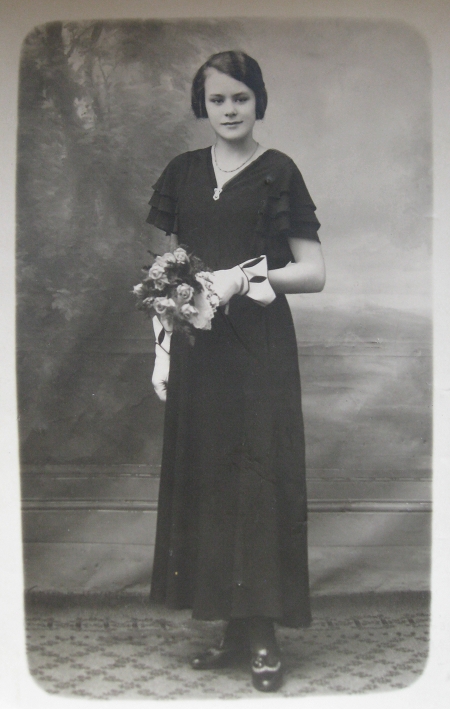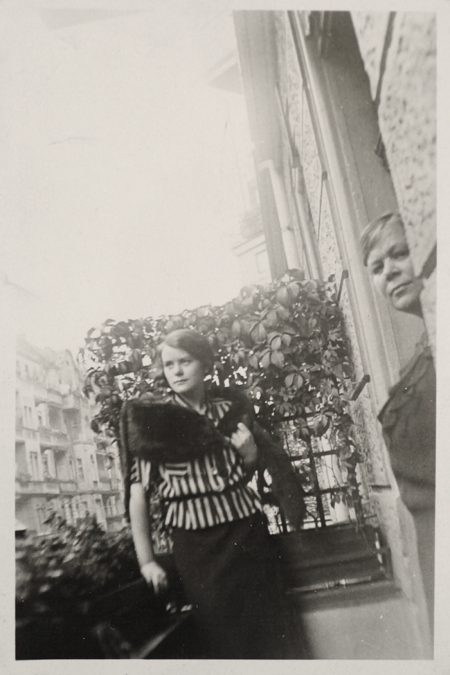Gerda

Gerda Schellhase, fotographer unknown
randform reader Bart asked about my grandmother Gerda. As said before I am reluctant to talk about my family. However in some sense – especially if they are rather part of history- I may make an exception. Talking about them may be important to understand history.
Gerda was musically rather gifted. She gained admission to the reknown Stern Conservatory. Her father, a cellist, wanted her to be a pianist. After his suicide however it was not possible to maintain her education. My greatgrandmother Grete (who took also partially care of me, when I was small) ran a pub and I guess the costs of the conservatory may have played a role in that carrier path.
Gerda married and got my father at a very young age at the beginning of the forties. She got divorced when my father was 1 year old. After that she got engaged with a russian army officer, who was probably in the army of Vlassov or Krasnov.
He died at the end of world war II before they could marry. It is told that he was a russian nobel, but I don’t know wether this is true. It seems Gerda went to russia in the seventies to look for the place, where he came from.
After the war was over she spoke fluently russian, played the piano well and lived in Berlin-East. After working as a shop assistant and helping out her mother etc., she finally got a rather good job at the berlin state library, Unter den Linden, where she was a “Lektor für volksdemokratische Sprache”. Amongst others she had a relationship with a russian “starnyi maschinist” (a mechanical engineer) who was called “Kottki”. However Kottki got problems due to this. Due to economic or political reasons she went with my father finally to Berlin-West in 1954. Here she found a job as a gate keeper for Siemens in Berlin-Siemensstadt and later on remarried a warehouseman. My father gave her piano away to movers, when I was five years old. She died in her late fifties from brain cancer.

Gerda and Grete Schellhase on the balcony at their appartment in Fuldastr. Berlin-Neukölln around 1933, fotographer unknown
February 5th, 2012 at 12:15 am
Nad wrote: “My greatgrandmother Grete (who took also partially care of me, when I was small)”
Do you have any recollections of your greatgrandmother ? With her experience she must have been a great caretaker.
May 21st, 2012 at 10:05 pm
You haven’t answered my question and by the way why did your father give away the piano? how did you do your lessons then? Did he buy another one?
May 27th, 2012 at 9:56 pm
@muesli
sorry, but I don’t reply to all comments.
I have some recollections of Grete, for example I remember exactly when she taught me how to tie a shoelace. i must have been four years old or so. We shared an appartment, when I was small. She lived in one room and my parents, my sister and me in the other room (plus one common room and a tiny kitchen). My mom was working mostly full-time. Grete would often take me with her when she visited her friends (like she knew a lot of other pubowners) and eventually feed me with things like Leberwurst. But at the age of 2 1/2 I was sent the whole day to Siemens-Betriebskindergarten.
My father had not so many good memories with the piano. Moreover we moved
into a clairaudient 70s highriser where you can’t play an instrument unless you want
to get into trouble. Luckily today there are electronic instruments. My father actually soldered together a kind of electric piano construction kit when I was a little older, but it had split manuals and there was no way to get lessons for this instrument. So my sister and me didn’t learn an instrument as a kid and neither did the other kids around us.
I took though some instrumental lessons when I was a student, but when I started with my diploma thesis and later the Ph.D. thesis, I couldn’t maintain this. Both – working (after the prediploma I financed my studies myself) and doing a thesis left no time for instrumental lessons and this didn’t get much better after the thesis.
It’s only very recently that I started to learn the guitar (my husband Tim teaches me an hour every one or two weeks), but don’t be afraid – I currently do not intend to torment you with the result :)
May 31st, 2012 at 11:13 am
In the link with the comment of Bart you wrote about your other grandmother:
“So she was rather openly opposing the Nazis. In fact Rheinhold bailed her out from the SS, which arrested her, because she secretely supported her former jewish landladies with money (she was seen by neighbours, when she regularily slipped an enveloppe).”
So she was being bailed out by a Nazi and married him – I wouldn’t call that “opposing the Nazis”. Other people left their life in the battle against the Nazi’s and your grandmother married a Nazi!
It must feel awkward to have all those Nazi’s in the family. Aren’t you afraid that there are some genetic leftovers?
December 3rd, 2013 at 2:33 pm
muesli wrote:
It is a difficult question how much of the motivations of a german to join the Nazi movement was due to a genetic disposition. And it is even difficult to tell how much single individua could have changed the Nazi’s pathways. In particular I do think that the high grade of organisatorial structure within german society played quite a role in the scope of the Nazi’s destructive actions. If you have a society, in which humans are interlinked like within a machine then if this machine gets ill-guided terrible things may happen rather “efficiently”. Of course every indivduum in Germany was involved and yes too few people tried to stand against the Nazi system, but as said I find it is really difficult to tell how much this kind of behaviour was due to genetic dispositions or rather cultural and economic pressure and circumstances. And each individual case may sometimes be rather difficult to judge about.
You could of course in principle condemn every german, who was not in active resistance. But I think it is also important to look at the grey values in between and to think about what such judgements really mean. This is especially important for understanding how such a system could work at all. Yes my grandmother Annemarie was not openly opposing the Nazi’s in an active way, she however displayed at least some passive resistance like by not becoming a party member, although I could imagine that my grandfather – being a Nazi – put quite some pressure on her. She gave birth to two children during the war, cared about her mother (her father had died in the frst world war) and she helped her sister-in-law to raise and care for five children in Berlin (Annemarie’s brother Oskar died in a russian prisoner of war camp as much as I know). How much active resistance should be demanded for in such a case?
Things are of course clearer with my grandfather Rheinhold and as said I think he was in jail for his Nazi actions. My grandfathers died when I was still a child otherwise I would have certainly talked to them about their actions. I meanwhile found out a bit more about Rheinhold. He did join the Nazi party rather early, namely on march 1st 1932, however I don’t think anymore that he was among the first thousand party members, may be I misheard something like “the first thousands”. His function during the Nazitime was “Leiter der Gau-Hauptstelle Rechnungswesen/Gauschatzmeister”. If I interpret this correctly he was thus responsible for the Nazi’s bookkeeping in Berlin.
December 4th, 2013 at 3:13 pm
Are you sure about that “Gauschatzmeister” ? And isn’t a Schatzmeister more a treasurer? What exactly was his task?
December 4th, 2013 at 3:51 pm
@Dr. Dietrich
No I am not sure about the word “Gauschatzmeister”. It is what I read off from Rheinholds handwriting on a bad copy of a survey which had to be filled in by members of the Nazi party the NSDAP. A relative of mine had found this survey in some archive and it seems they had a bad copying machine at that archive.
If I decipher correctly he wrote that he is the “Leiter der Hauptstelle Rechnungswesen” (Dienststellung) and “Gau Hauptstellenleiter” (Tätigkeit) and that he belongs to the “Amt Gauschatzmeister, Rechnungswesen”(Dienststelle). I understand this as that he was in charge for the bookkeeping at the Berlin treasurer.
That is you are right Schatzmeister is to be translated as treasurer or bursar.
I don’t know exactly what is tasks were. Via googling, I found a
google book entry which describes how the Gauschatzmeister in Munich had to ask the Reichsschatzmeister for more money for a kind of pageantry, so I think he was probably the person who kept all that numbers together for the Gauschatzmeister.
January 29th, 2014 at 10:05 am
Are you sure of that ? Can you show us the document?
If he was in charge for the bookkeeping in Berlin then he must have noticed what the Nazi’s did for example to jewish property! How much misery could have been prevented if he would have sabotaged the finances of the Nazi’s or at least if he would have had whistleblowed that knowledge !!
December 25th, 2014 at 3:12 pm
The Wikipedia entry about Vlasov says that “Vlasov was commanding 4th Mechanized Corps” before he allied with the Germans and founded the Russian Liberation Army. Do you know something about the mechanization of that Russian Liberation Army?
June 26th, 2015 at 8:30 am
This link to the book is quite instructive. The Nazi’s spend in 1940 alone 29.000 Reichsmark for the pageantry carriage! And they held the Grosse Deutsche Kunstausstellung even in 1944 (starting in July), if you see this in context to what happened in the rest of Europe in 1944 like in the following winter then this makes you want to puke.
June 29th, 2015 at 9:52 am
It should be reminded of that there was
famine already at the begining of the war. In fact Wikipedia writes:
August 12th, 2015 at 8:55 am
Your greatgrandmother was a Berlin pubowner that is interesting. I am a great fan of Heinrich Zille who did marvelous sketches of that Pub-“Milljöh.”
Was Grete originally from Berlin?
November 29th, 2015 at 10:53 am
If you include the vicinity of Berlin to Berlin: yes. Her parents were already pubowners, but I think their pub was in Spandau, which belonged to Berlin only after the Greater Berlin Act. So it might be that she was not born exactly in the middle of Berlin (like my parents).
Quite some years ago I had one day, where I was trying to distract myself, so I went to look up her ancestors. I think at least one of her parents was born or at least registered in Heiligensee, so I studied the church books in Heiligensee. I think I was able to trace back parts of the ancestry until the first church book.
The families in Heiligensee and the immediate vicinity like Hohen Neuendorf intermarried quite a bit. Unfortunately I lost my notes, so I don’t know anymore the time period for the first church book, but it might have been in the 17th century.
November 30th, 2015 at 9:07 pm
My german is not so good but isn’t the translation of Heiligensee: “holy lake” ?
November 30th, 2015 at 10:33 pm
Why is that place where you live called holy lake ?
January 30th, 2017 at 7:30 pm
I recently heard about violent ashky-nazis. Are these a problem in Germany?